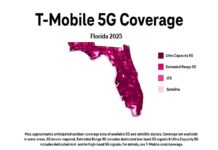Verizon has built a big stash of millimeter wave spectrum, FierceWireless’ Monica Alleven points out, while T-Mobile stacked up 600 MHz airwaves (and then secured Sprint’s holdings of 2.5 GHz via merger).
And both are digging in, in touting their advantages (with Verizon, for the high-band approach, and with T-Mobile, for its mid- and low-band spectrum).
Verizon launched its Ultra Wideband service early on the back of the mmWave spectrum, and has since spread the offering to 36 cities where it’s hitting peak speeds close to 2 Gbps. And the company says it’s learned a lot, having underestimated the distance its signals could travel, and now “getting much more out of millimeter wave than even some of our engineers thought.”
Verizon is staying bullish on its airwaves because mmWave is a differentiator, Chief Product Development Officer Nicola Palmer says: Some 5G deployments aren’t as good as 4G, and “We wanted 5G to really be the ‘G’ … It’s got to be something different and that’s what we’re deploying.” The carrier is also deploying dynamic spectrum sharing to share spectrum with 4G LTE in lower bands.
T-Mobile says DSS means limited capacity. “Our strategy is to build 5G with free and clear spectrum and utilize DSS as another tool in our toolbox, deploying only where it makes sense,” says President of Technology Neville Ray. Millimeter wave has its place but “you don’t build a large-scale 5G network with it. You build 5G with a low-band, broad connectivity layer” – its 600 MHz band, where it’s getting peak speeds of 1 Gbps.
T-Mobile has 319 MHz of sub-6-GHz spectrum nationwide – nearly double that of AT&T and nearly triple that of Verizon. It also happens to have more mmWave spectrum than AT&T (NYSE:T), Ray notes.
The wild card ahead: The quiet period has begun for December’s C-band auction, where midband spectrum held by satellite operators gets sold and repurposed for 5G deployment. The auction marks the nearest opportunity for Verizon to secure valuable midband airwaves to broaden its approach, Alleven notes.























